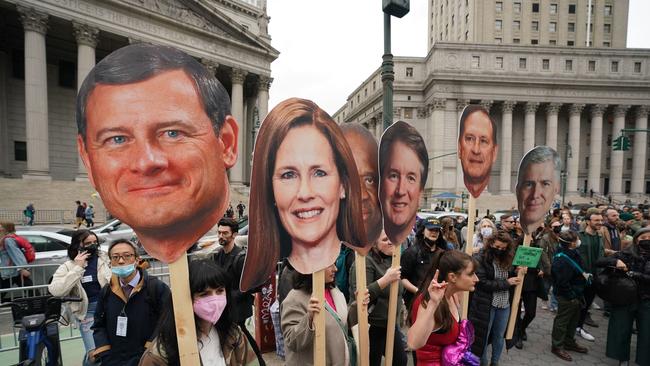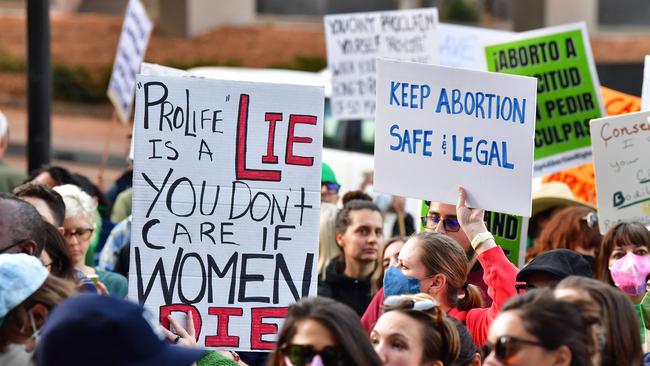The birth of a new conversation on American liberalism
A leaked draft US Supreme Court opinion on the right to abortion strikes at the heart of left ideology.

One thing we did not think we would be talking about on Mother’s Day was abortion, but thank God we are. It is about time the issues around motherhood were taken more seriously than as banal hearts and flowers fodder for the advertising industry.
The unprecedented leaking of a draft opinion on Roe v Wade from the US Supreme Court gives the strongest indication yet that the court will overturn the contentious ruling which turned abortion into a “right” and has ensured this topic will go back to the centre of liberal argument again.
Why? Because for captives of neo-Liberal “right think”, abortion is totemic.
Roe v Wade was about the construction of a fallacious view of human rights. It has become a symbol of the triumph of the absolutist individualism of the age, in which choice itself has become the only moral paradigm; not whether the choice is good or bad.
Instead, it is “My choice, my body, my right”, forgetting the other human being at the centre of the choice. The judgment also marked the triumph of cleverly constructed language decoupling the truth from the semantics to justify that choice. This leaked Supreme Court document is not a definitive opinion, but if it is a guide it will be what one commentator has called a “nuclear bomb of an issue, planted at the core of American liberalism”.
The debate over legalising abortion really was the beginning of the so-called “culture wars” because the arguments for it were always based on ideology, not facts.
Indeed, the current social and cultural ideological mire, the confusion over feminism and even obscure sexual identity politics can be traced back to the convoluted language used by the pro-choice arguments that allowed so many fallacies, both philosophical and practical, to become part of the fabric of modern thought.
Roe v Wade was the first phalanx of the march through the institution of the family, because it was not about the rights of the unborn, it was simply about women, and of course fathers disappeared from those arguments.
Initially, the pro-abortion argument relied on a narrowly individualistic, anti-male ideology of feminism, now passe, especially as young militant feminists of 40-odd years ago mellowed and had children. But still the woman was the central problem, not the child.
Even worse, abortion rights activists employed an amoral fallacy: that the choice the woman made became the ultimate good – not whether it was a good or a bad choice. For the unborn child, abortion is obviously not good.
So, Roe v Wade also had an immediate effect on the whole concept of rights, and not just in the US. You don’t have to have been around for more than 40 years to see how sophistic “rights talk” has infiltrated the language about everything from marriage, to what sex you want to be, to your right to die. This is because when abortion was more or less enshrined as a right in the US, the effect was to invert a practice which had hitherto been regarded as barbarous, as acceptable.

It became a hallmark of pro-Western civilised liberalism. It is even enshrined in EU law. Among its most vehement supporters, the judgment is almost held in the same reverence as the antislavery legislation of the past.
The airily dismissive “already settled” argument that characterises our own commentary about abortion is just a complacent way of not talking about the morality, and consequently truth in the language of abortion has disappeared. The language is deconstructed and mutated into the narrow parameters of liberal right think so that even the word abortion is substituted for termination. I recently heard a journalist referring to the court’s possible decision as “restricting access to termination services”.
Meanwhile “pregnancy” becomes a sort of woman’s disease, rather than as it once was, being “with child”. The ideological doublethink also allows the pro-abortion lobby to blithely ignore the real-world advances in gynaecology, obstetrics and foetal imagery, which is so startling that Planned Parenthood instructed its staff not to show ultrasound pictures to women wanting abortions.
Yet, abortion campaigners still trot out the passe notion that pregnancy is a risk and women die from botched abortions, ignoring universal social trends such as later marriage which has naturally suppressed the birthrate and resulted in more women who want children and can’t have them.
Striking Roe v Wade will not be entirely unexpected, because it was based on the shaky grounds of women’s privacy, ignoring the child. However, according to Pew research, although the American public has ambivalent views on abortion, more than 50 per cent are in favour of keeping it legal, and even if Roe is struck down, it will not outlaw abortion but take it out of the realms of constitutional law, and simply give it back to the electorate to decide.
That will mean America – and the world – should be prepared for more demonstrations and more agonising over “rights”.
However, it is not because of public support for abortion that President Joe Biden so vehemently supports and claims he will enact legislation. It is because this issue has such ideological power for the left. Its totemic importance cannot be underestimated.



